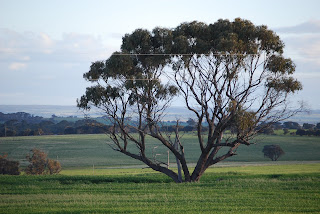Jane’s Report on the Birchip Womens’ Agronomy Group Workshop
14th October 2010
Dr Harm van Rees, a long term consultant to BCG explained Climate Change and Farm Variability, using maps and graphs and science to simplify a complex topic.
Using research and crop trials to help farmers ‘weather the weather’
- Mallee region in Victoria has had 9 years of low decile rainfall.
- This dry period has seen more permanent change in weather patterns and the pattern is different to what we see in history. Very low spring rainfall.Increase in early summer rainfall. Higher temperatures and more hot days in spring
- Locusts are a looming concern for crops this 2010 spring/summer First time they have come into Victoria and hatched prior to harvest. Potentially could be very damaging. Farmers are monitoring hatchings and getting prepared to spray
Finance- we only have 100% though sometimes we want to spend more. 30% of farm income is now spent on finance. There has been a run of negative income years in the Mallee
BCG crop trials are looking at input cost cutting strategies.
Farm input costs have had to be reduced as finance costs have increased- Even though there have been large fluctuations in grain and input prices, it has been rainfall that has most affected profit – the Mallee region needs decile 4 rainfall (250ml) to make a crop profit.
Options
Hope for rain
Diversification (eg duck sheds, sheep feedlots, hay) It costs $35.00/head to bring sheep from Western Australia to Victoria
Growing Hay; it was noted that it is difficult to grow good hay and a good crop in the same year – for example this year’s vetch crops mowed before this heavy rain are now slime
Increasing Sheep numbers;
The Mallee had a new watering system implemented in recent years – gone from channels to water pipes. Some farmers didn’t put in the new infrastructure like troughs, so are no longer set up for stock.
In poor crop years having a sheep feedlot significantly increases the cash margin
Cropping – spreading the risk with spread of sowing dates. Early sowing options (by 30th April) reduces risk of heat shock days in Spring – more of a concern than frost in this region- Sow a proportion dry to spread time of flowering
- Mixed seed sowing may be an option – must be declared
- Understand the business and how much it costs – Yield Profit
- Learn how to market your grain - must keep on top of it.


















.JPG)
.JPG)
.JPG)
.JPG)
.JPG)





